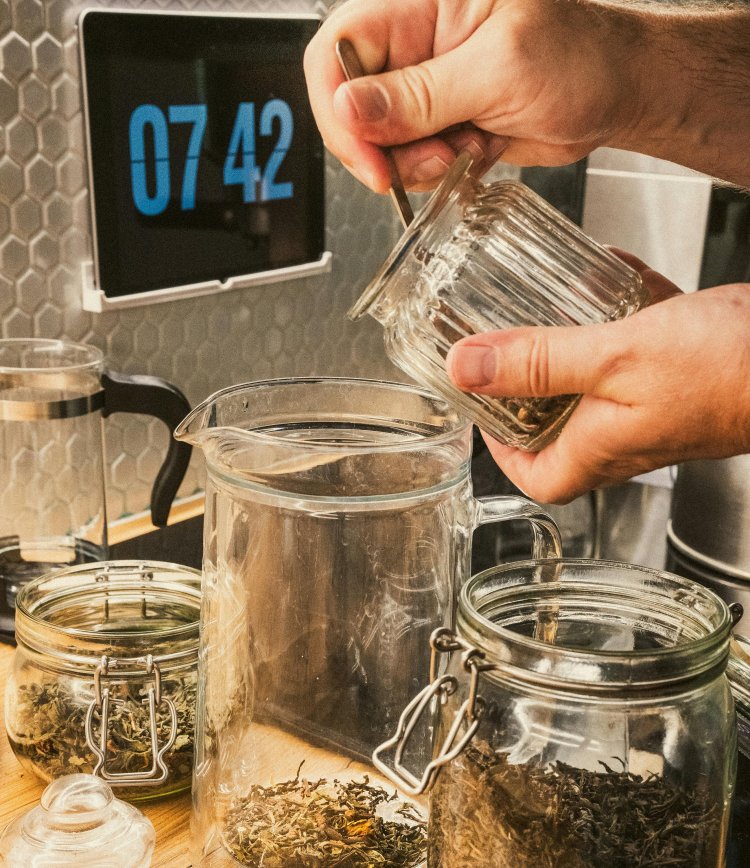How to Properly Store Organic Loose Leaf Tea for Maximum Freshness
Share this Post to earn Money ( Upto ₹100 per 1000 Views )

Organic Loose Leaf Tea
Organic loose leaf tea is one of the few beverages enjoyed across the world for its rich taste and flavor with its arousal fragrance, coupled with organic health benefits. Unlike the tea bags, it provides a far better drinking experience as the leaves can expand fully and release their complex flavors. However, the entire drinking experience requires correct storage of the tea to enjoy it fresh.
The critical method for storage of organic loose leaf tea, which this article embarks on, covers factors affecting freshness and gives expert tips to maintain flavors for longer.
Factors Affecting Tea Freshness
The freshness of loose leaf tea can be grossly affected by a number of environmental variables. These include:
a. Oxygen Exposure
Oxidation, which is when tea leaves are exposed to oxygen, may lead to loss of flavor and aroma. Proper storage should hence be maintained in airtight containers.
b. Light and UV Rays
The exposure of light, more so UV rays, to tea degrades the essential oils in it, hence diminishing its flavor profile. Tea must always be stored in opaque containers away from direct light.
c. Humidity Levels
c. Moisture is the teas' worst enemy. Tea leaves, when exposed to high humidity, absorb water; this may result in mold and spoilage.
d. Temperature Fluctuations
Frequent changes in temperature disrupt the stability of tea leaves. For instance, green tea requires a consistently cool temperature for freshness.
Choosing a Storage Container
Storage containers also come into play in the keeping of fresh loose leaf tea.
a. Airtight Containers
Teas should be kept in airtight containers to keep oxygen out. This actually helps in preventing the oxidation process, preserving both flavor and aroma.
b. Material Considerations (Glass, Metal, Ceramic)
Storage containers for tea are best if made of non-reactive materials such as glass, metal, or ceramic. Plastic, for its tendency to leach into the tea leaves, is not advisable.
c. Ideal Container Size
This will also reduce the quantity of air inside the container, using containers that are appropriately sized for the amount of tea you are storing.
Optimal Storage Locations
Even the best container cannot protect your tea if it is stored in the wrong place.
a. Keeping Away from Sunlight
Direct sunlight is poisonous to tea, and doing so will make it lose both flavor and nutritional value. Always store your tea in a dark cupboard or pantry.
b. In cool and dry places
Teas should be kept in a cool and dry place because much moisture and temperatures spoil them.
c. Close to sources of heat
Most people tend to try to keep tea away from ovens or stovetop as it accelerates aging due to fluctuating heat.
Best Way of Storage of Tea
If you want the best out of your organic loose leaf tea, follow these best practices:
a. Different Teas in Different Containers
Teas have different needs when it comes to storage. Store them separately to avoid flavors being crossed.
b. Keep Odor Contamination Away
As much as tea can easily take on odors, keep it away from pungent-smelling foods such as spices or coffee.
c. How to Treat the Tea After Opening
Tea, once opened, needs to be consumed within reason, usually in less than 6 to 12 months, to ensure freshness.
Special Storage Considerations for Different Types of Teas
Different types of teas require a little special storing conditions.
a. Green Tea
Green tea is somewhat more sensitive to light and heat, which must be kept in tightheart, opaque containers in places where coolness prevails.
b. Black Tea
Black tea, being strong enough, also wants to avoid the light and humidity.
c. Herbal and Floral Teas
These teas are highly aromatic and are much inclined to flavor loss if not stored well.
d. Oolong Tea
Oolong tea falls between green and black tea in requirements. Airtight containers are ideal with cool conditions.
Long-term Storage Tips
For those who wish to store tea for a longer time period:
a. Freezing Loose Leaf Tea
The tea can be frozen, but only if the storage container is airtight, seal-tight, and moisture-proof. Do not thaw and refreeze the tea frequently, however.
b. How Long Can Tea Stay Fresh?
Most teas can be considered fresh for a period of 12-24 months depending on the variety and condition of storage. If the tea is stored properly, this time period increases.
Common Tea Storage Mistakes to Avoid
Following are some common mistakes that have to be prevented to keep the tea from going stale:
a. Storing Tea in Plastic Bags
Plastic bags can degrade flavors of tea, so choose airtight containers.
b. Storing in Transparent Jars
Light can degrade the quality of tea through transparent jars.
c. Keeping Tea Near Spices or Coffee
Tea absorbs odors; therefore, it is best to store it away from pungent-smelling substances.
Importance of Proper Labeling
Proper labeling will help you to keep track of your tea's freshness.
a. Labeling Dates of Purchase and Opening
This will help you keep tabs on how long the tea has been stored from the date of purchase and date of opening.
b. Easy Identification of Varieties of Teas
Good labeling will ensure you are not confused between different varieties of teas, each of which has a different storage requirement.
Organic Loose Leaf Tea's Shelf Life
Loose leaf tea's shelf life is different depending on the type it is.
a. Knowing When Your Tea Has Gone Stale
Stale tea does not have a lively aroma and flavor. When your tea tastes flat, then it is time to replace it.
b. How Freshness Affects Flavor
Fresh tea has a more complex and depthful flavor, while stale tea tastes lifeless and boring.
Effects of Poor Storage on Tea Quality
Poor storage brings forth several problems:
a. Loss of Fragrance
Poorly stored tea loses its aromatic oils, reducing the fragrance.
b. Flavor Deterioration
Delicate flavors tend to break down with time if the tea is exposed to air, light, or moisture.
c. Nutrient Loss
There is a high tendency for organic teas to lose their nutritional value if not well kept.
Eco-Friendly Options for Storing Tea
Eco-conscious tea drinkers have several eco-friendly options for storing their tea:
a. Sustainable Storage Materials
Glass and stainless steel are both very feasible alternatives for eco-friendly storage due to their durability and recyclability.
b. Reusable and Recyclable Containers
Let us continue with choosing reusable or recyclable containers that will reduce environmental pollution.
Packaging to Preserve Freshness of Tea
The freshness of tea largely depends on the way it was packaged.
a. Bulk Tea vs. Sealed Tea
Tea packaged in sealed formats stays fresh for a longer period than tea in bulk formats. On the other hand, bulk tea may maintain its life when well stored.
b. Packaging Material to Keep Fresh for Long
It preserves the freshness in teas for longer periods of time when packed right in foil and vacuum-seal bags.
The Art of Storing Tea According to Expert Advice
Some worthy expert advice is also provided in storing tea.
a. Suggestions Given by Sommeliers
Most tea sommeliers do advice on the use of small size airtight containers and refraining from direct tea to moisture.
b. How Tea Producers Recommend Loose Leaf Tea Storing
Producers do insist that for keeping up the quality of tea, storage should be done in cool, dark, and dry locations.
Future Trends in Storing Tea
With technology advancing, there are newer ways of storing tea.
a. Technological Innovations in Storage
Some companies are involved in developing smart storage containers that control temperature and humidity to maintain freshness in teas.
b. Smart Storage Solutions for Maximum Freshness
The innovative storage systems, which have integrated sensors, can monitor the status of the tea to preserve it fresh for as long as possible.
Try Akshit’s Organic Loose Leaf Tea! Akshit's premium organic loose leaf tea is sourced from the finest farms to deliver a rich, aromatic tea experience. Enjoy the authentic flavors of nature in every cup—perfectly stored for maximum freshness!
Conclusion
Conclusion Organic loose-leaf tea needs good storage so that it may not lose its freshness. Employing airtight containers, storing the tea in cool and dry places, and following best practices will allow lovers of the teas to enjoy the richness both in flavor and health benefits of the teas for longer.















